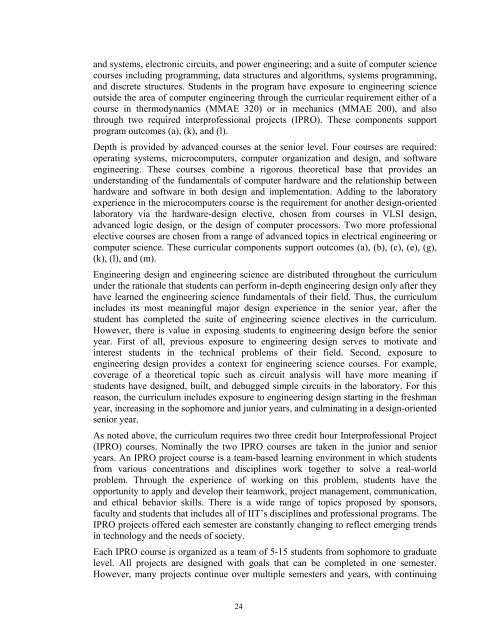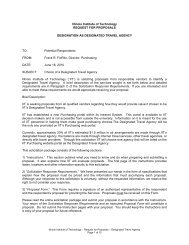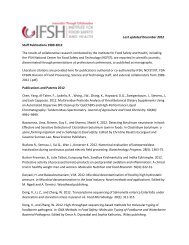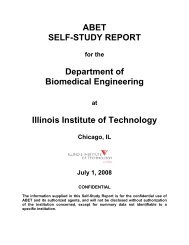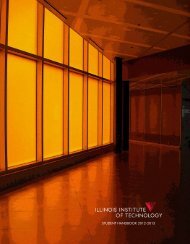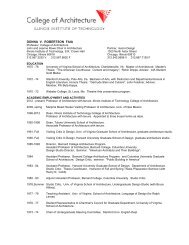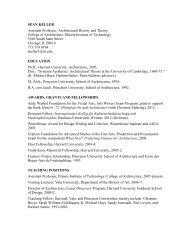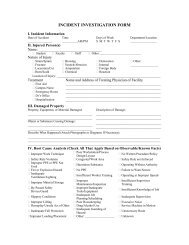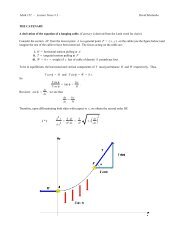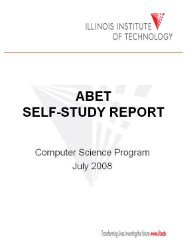IIT BSCPE Self Study 2008 - Illinois Institute of Technology
IIT BSCPE Self Study 2008 - Illinois Institute of Technology
IIT BSCPE Self Study 2008 - Illinois Institute of Technology
Create successful ePaper yourself
Turn your PDF publications into a flip-book with our unique Google optimized e-Paper software.
and systems, electronic circuits, and power engineering; and a suite <strong>of</strong> computer science<br />
courses including programming, data structures and algorithms, systems programming,<br />
and discrete structures. Students in the program have exposure to engineering science<br />
outside the area <strong>of</strong> computer engineering through the curricular requirement either <strong>of</strong> a<br />
course in thermodynamics (MMAE 320) or in mechanics (MMAE 200), and also<br />
through two required interpr<strong>of</strong>essional projects (IPRO). These components support<br />
program outcomes (a), (k), and (l).<br />
Depth is provided by advanced courses at the senior level. Four courses are required:<br />
operating systems, microcomputers, computer organization and design, and s<strong>of</strong>tware<br />
engineering. These courses combine a rigorous theoretical base that provides an<br />
understanding <strong>of</strong> the fundamentals <strong>of</strong> computer hardware and the relationship between<br />
hardware and s<strong>of</strong>tware in both design and implementation. Adding to the laboratory<br />
experience in the microcomputers course is the requirement for another design-oriented<br />
laboratory via the hardware-design elective, chosen from courses in VLSI design,<br />
advanced logic design, or the design <strong>of</strong> computer processors. Two more pr<strong>of</strong>essional<br />
elective courses are chosen from a range <strong>of</strong> advanced topics in electrical engineering or<br />
computer science. These curricular components support outcomes (a), (b), (c), (e), (g),<br />
(k), (l), and (m).<br />
Engineering design and engineering science are distributed throughout the curriculum<br />
under the rationale that students can perform in-depth engineering design only after they<br />
have learned the engineering science fundamentals <strong>of</strong> their field. Thus, the curriculum<br />
includes its most meaningful major design experience in the senior year, after the<br />
student has completed the suite <strong>of</strong> engineering science electives in the curriculum.<br />
However, there is value in exposing students to engineering design before the senior<br />
year. First <strong>of</strong> all, previous exposure to engineering design serves to motivate and<br />
interest students in the technical problems <strong>of</strong> their field. Second, exposure to<br />
engineering design provides a context for engineering science courses. For example,<br />
coverage <strong>of</strong> a theoretical topic such as circuit analysis will have more meaning if<br />
students have designed, built, and debugged simple circuits in the laboratory. For this<br />
reason, the curriculum includes exposure to engineering design starting in the freshman<br />
year, increasing in the sophomore and junior years, and culminating in a design-oriented<br />
senior year.<br />
As noted above, the curriculum requires two three credit hour Interpr<strong>of</strong>essional Project<br />
(IPRO) courses. Nominally the two IPRO courses are taken in the junior and senior<br />
years. An IPRO project course is a team-based learning environment in which students<br />
from various concentrations and disciplines work together to solve a real-world<br />
problem. Through the experience <strong>of</strong> working on this problem, students have the<br />
opportunity to apply and develop their teamwork, project management, communication,<br />
and ethical behavior skills. There is a wide range <strong>of</strong> topics proposed by sponsors,<br />
faculty and students that includes all <strong>of</strong> <strong>IIT</strong>’s disciplines and pr<strong>of</strong>essional programs. The<br />
IPRO projects <strong>of</strong>fered each semester are constantly changing to reflect emerging trends<br />
in technology and the needs <strong>of</strong> society.<br />
Each IPRO course is organized as a team <strong>of</strong> 5-15 students from sophomore to graduate<br />
level. All projects are designed with goals that can be completed in one semester.<br />
However, many projects continue over multiple semesters and years, with continuing<br />
24


